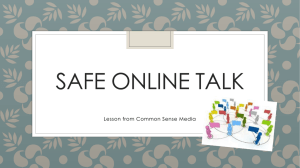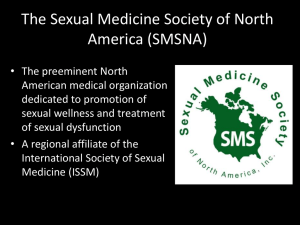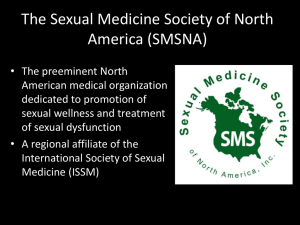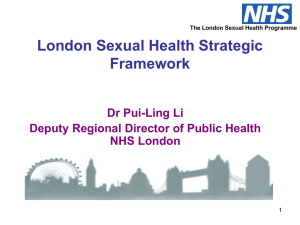450. relationships between adults and students
advertisement
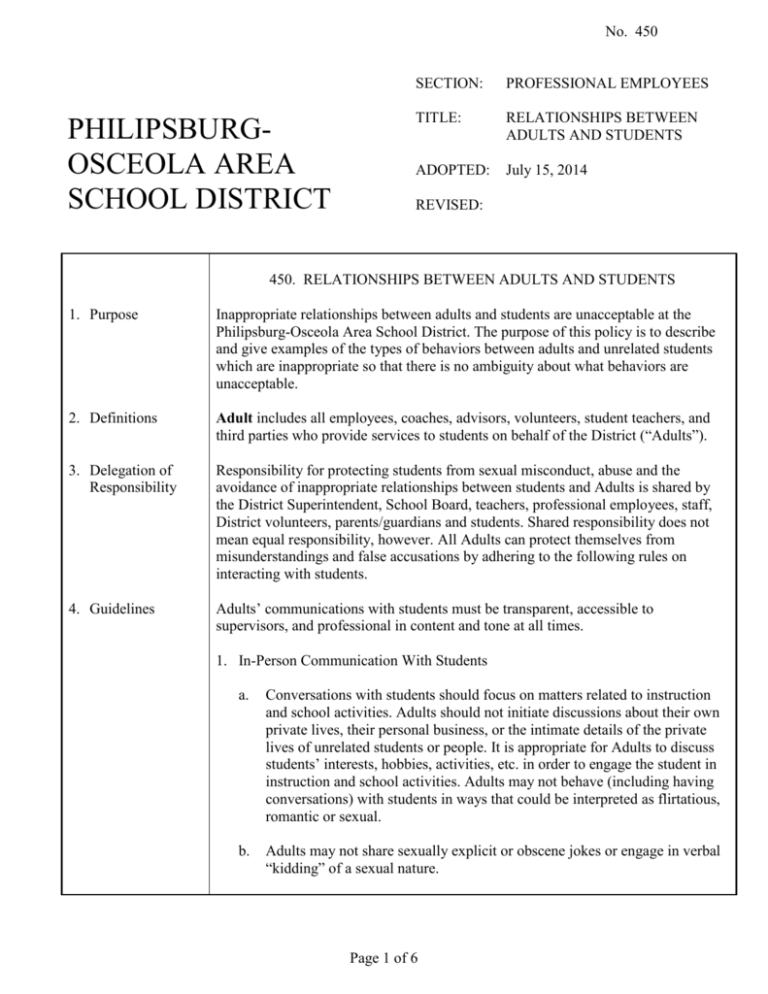
No. 450 PHILIPSBURGOSCEOLA AREA SCHOOL DISTRICT SECTION: PROFESSIONAL EMPLOYEES TITLE: RELATIONSHIPS BETWEEN ADULTS AND STUDENTS ADOPTED: July 15, 2014 REVISED: 450. RELATIONSHIPS BETWEEN ADULTS AND STUDENTS 1. Purpose Inappropriate relationships between adults and students are unacceptable at the Philipsburg-Osceola Area School District. The purpose of this policy is to describe and give examples of the types of behaviors between adults and unrelated students which are inappropriate so that there is no ambiguity about what behaviors are unacceptable. 2. Definitions Adult includes all employees, coaches, advisors, volunteers, student teachers, and third parties who provide services to students on behalf of the District (“Adults”). 3. Delegation of Responsibility Responsibility for protecting students from sexual misconduct, abuse and the avoidance of inappropriate relationships between students and Adults is shared by the District Superintendent, School Board, teachers, professional employees, staff, District volunteers, parents/guardians and students. Shared responsibility does not mean equal responsibility, however. All Adults can protect themselves from misunderstandings and false accusations by adhering to the following rules on interacting with students. 4. Guidelines Adults’ communications with students must be transparent, accessible to supervisors, and professional in content and tone at all times. 1. In-Person Communication With Students a. Conversations with students should focus on matters related to instruction and school activities. Adults should not initiate discussions about their own private lives, their personal business, or the intimate details of the private lives of unrelated students or people. It is appropriate for Adults to discuss students’ interests, hobbies, activities, etc. in order to engage the student in instruction and school activities. Adults may not behave (including having conversations) with students in ways that could be interpreted as flirtatious, romantic or sexual. b. Adults may not share sexually explicit or obscene jokes or engage in verbal “kidding” of a sexual nature. Page 1 of 6 450. RELATIONSHIPS BETWEEN ADULTS AND STUDENTS - Pg. 2 c. Private, one-on-one conversations with students should take place in a place where the student and Adult can be seen, but not necessarily heard by others, such as in a classroom with the hallway door open, in a hallway, or on an athletic field. d. Adults may not conduct an ongoing series of one-on-one meetings with an individual student without the knowledge of the principal. 2. Electronic Communications With Students a. All contact messages by coaches and advisors with team or club members shall be sent to all participating team or club members, except for messages concerning medical or academic privacy matters. In either case all messages with medical or academic privacy matters will be copied to the school principal and, in the case of athletic teams or groups, the Athletic Director and/or Assistant Principal will be copied. b. It is strongly recommended that Adults refrain from using personal wireless communication devices to text individual students and do not interact oneon-one with any students through personal online social networking sites. c. It is strongly recommended that generally all e-contacts between Adults and students should be through the District’s network and telephone system, except in emergency situations. d. Adults may not knowingly engage in online gaming with students unrelated to instruction. 3. Physical Contact - Physical contact between Adults and students should always be public, nonsexual and appropriate to the circumstances. a. Physical contact between Adults and students that is appropriate in the early elementary grades, such as a spontaneous hug, is not appropriate with older children. b. Physical contact meant to encourage or reassure students, such as a hand on the shoulder or a pat on the back, should be brief and unambiguous in meaning. Page 2 of 6 450. RELATIONSHIPS BETWEEN ADULTS AND STUDENTS - Pg. 3 4. Relationships And Social Interactions With Students Establishing intimate, personal relationships with students is prohibited. Examples of prohibited Adult conduct include, but is not limited to: a. Taking an undue interest in a student (i.e., having a “special” friend or a “special relationship”) with a particular student. b. Giving gifts of money to a student without cause and administrative approval. c. Engaging in peer-like behavior with students. d. Touching students without appropriate reason. e. Getting the student out of class repeatedly to visit the teacher or to accompany the teacher for some task. f. Talking to the students about the Adult’s problems such as financial, health or marital problems. g. Telling the student the Adult’s “secrets” and having “secrets” with the student. h. Initiating conversation with the student about the student’s personal problems to the extent that the Adult becomes a confidant of the student when it is not the Adult’s assigned responsibility to do so. i. Being alone with the student behind closed doors at school, excluding counselors, psychologists, nurses and any individual whose job description requires a one-on-one setting with the student. j. Taking the student on outings without another adult present. k. Giving students rides in the Adult’s personal vehicle without approval of the building principal or designee or the parent/guardian. l. Initiating or extending contact with students beyond the school day for purposes of a personal nature. m. Using e-mail, text-messaging or websites to discuss personal topics or interests with students. Page 3 of 6 450. RELATIONSHIPS BETWEEN ADULTS AND STUDENTS - Pg. 4 n. Invading the student’s privacy (i.e. being alone with the student in a bathroom, or locker room, or discussing the student’s dating relationships, sexual orientation, or sexual experiences). o. Telling sexual jokes in the presence of students. p. Engaging in talk containing sexual innuendo or banter in the presence of students. q. Talking about sexual topics that are not specifically and directly related to the curriculum. r. Showing sexually explicit images and/or pornography to students. Pol. 248 s. Any type of inappropriate physical contact with a student or any other conduct that might be considered harassment under the Board’s policy on Harassment and Sexual Harassment of Students (see Policy 248). t. Singling out a particular student or students for personal attention and friendship beyond the ordinary professional staff-student relationship. u. Being present and socializing where students are consuming alcohol, drugs or tobacco. v. For non-guidance/counseling staff, encouraging students to confide their personal or family problems and/or relationships. If a student initiates such discussions, Adults are expected to refer the student to appropriate school resource. w. Sending or accompanying students on the Adult’s personal or professional errands unrelated to any educational purpose. x. Disclosing the Adult’s personal, sexual, family, employment concerns, or other private matters to one or more students. y. Permitting students to address Adults by their first names, or with personalized terms of endearment, pet names, or otherwise in an overly familiar manner. Page 4 of 6 450. RELATIONSHIPS BETWEEN ADULTS AND STUDENTS - Pg. 5 z. Socializing or spending time with students alone, without the permission of the parent/guardian (including but not limited to activities such as going out for beverages, meals or movies, shopping, traveling, and recreational activities) outside of school-sponsored events, except as participants in organized community activities. aa. Giving a student a ride alone in a vehicle in a non-emergency situation requires notification to both the parent/guardian and direct supervisor prior to the occurrence or if not possible, then within twenty-four (24) hours after the occurrence. bb. The initiation or the conduct of carrying out romantic or sexual relationships between District employees or volunteers and students are strictly prohibited, regardless of the age of the student or the proximity in the age of the District employee or volunteer and the student. 5. Personal Social Networking Nothing in this policy shall prohibit an Adult, student or guest from creating or using personal or private social networking sites acting outside the scope of their role in the district and with personally owned equipment. The Adult, student, or guest may not violate the privacy rights of Adults and students, may not use district personal and private information/data, images and copyrighted materials without consent of the owner of the material, and may not disrupt the district. Adults who maintain personal social networking sites are strongly encouraged to not engage Philipsburg-Osceola Area School District students in private conversations of either an academic or non-academic nature. 6. Reporting Apparent Violations Students and their parents/guardians are strongly encouraged to notify the Superintendent, principal or other administrator of concerns that this policy has been violated in letter or spirit. All Adults and independent contractors are required to promptly notify the Superintendent, principal (or other administrator), if they become aware of a situation that may constitute a violation of this policy. 7. Disciplinary Action District employees’ violations of this policy may result in a disciplinary action up to and including dismissal. For licensed or certified employees and Page 5 of 6 450. RELATIONSHIPS BETWEEN ADULTS AND STUDENTS - Pg. 6 independent contractors, the violation may also be reported to the Pennsylvania Department of Education. Violations involving sexual or other abuse will also result in referral to Child Protective Services and/or law enforcement in accordance with the Boards’ policy on Reporting Child Abuse and Neglect. Volunteers who violate this policy will be prohibited from volunteering for an appropriate period of time, as determined by the Superintendent or designee. 8. Awareness All Adults associated with the district will review this policy and be required to ‘sign-off’ acknowledging that they have received a copy, read such and have had an opportunity to ask questions. Adults shall direct any questions to the district Superintendent or designee. At the beginning of each school year, students and their parents/guardians will be notified of the existence of this policy, and of their shared responsibility to prevent inappropriate relationships between adults and students. 9. Dissemination Of Policy This policy shall be included on the District website and shall be described in all District employee, student and volunteer handbooks. The policy and any procedures developed to implement the policy shall be given to all adults via e-mail or hard copy at least once a year. References: Board Policy – 248 Page 6 of 6



